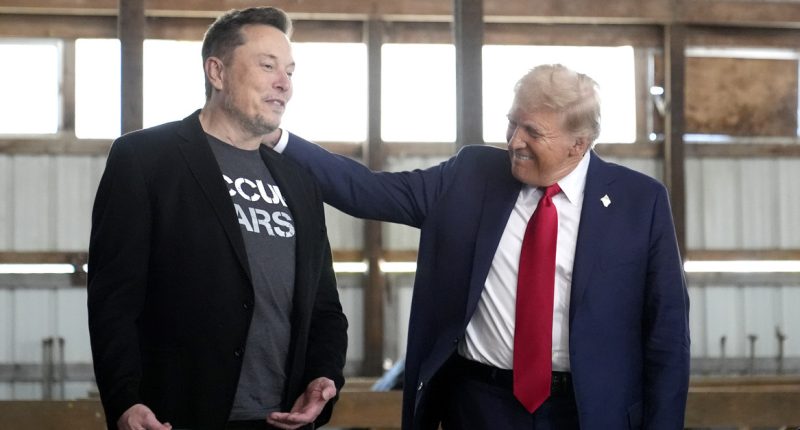Share this @internewscast.com
Elon Musk, CEO of Tesla and SpaceX, alongside Republican presidential candidate and former President Donald Trump, took part in a campaign event at the Butler Farm Show on Saturday, October 5, 2024, in Butler, Pennsylvania. (AP Photo/Alex Brandon).
This week, the Trump administration celebrated a significant legal win after a federal judge permitted Elon Musk and his Department of Government Efficiency (DOGE) to proceed with layoffs and the closure of field offices within the Social Security Administration (SSA).
On Tuesday, U.S. District Judge Amit P. Mehta, who was appointed by Barack Obama, issued a six-page memorandum opinion and order. He denied a request for a preliminary injunction that was filed by a group of nonprofits and several individual Social Security recipients aiming to prevent the government from scaling back operations.
On April 2, the plaintiffs in the case sued DOGE, Musk, and Social Security Acting Commissioner Leland Dudek alleging various statutory and constitutional violations — including claims under the Administrative Procedure Act (APA), the long-standing federal law that governs the actions of administrative agencies.
“Defendants are now executing a campaign of systemic dismantling: reducing offices, slashing the workforce by 7,000 employees, imposing a hiring freeze while drastically reducing overtime, consolidating regional offices from ten to four, and placing crushing new burdens on the agency’s local offices,” the 51-page lawsuit reads.
Love true crime? Sign up for our newsletter, The Law&Crime Docket, to get the latest real-life crime stories delivered right to your inbox.
In a three-page motion for a preliminary injunction filed along with the original petition, the plaintiffs argued they were likely to prove the proposed workforce reductions, office closures and “implementation of new policies requiring in-person services in local field offices, disproportionately impact people with disabilities.”
In the Tuesday order, however, the judge said none of the plaintiffs have “shown that they are at actual and imminent risk of suffering great harm” from any of the proposed actions.
“The court shares Plaintiffs’ concerns about the effects of the challenged actions on the SSA’s capacity to deliver services, but the law requires more than what they have offered to award the extraordinary intervention of injunctive relief,” Mehta writes.
In fact, the judge said, the plaintiffs had not even alleged conduct that could be traced to the specific DOGE proposals at issue.
Instead, the individual plaintiffs “largely” complained about “matters that predate the administrative actions at issue,” Mehta found.
The opinion highlights a few such complaints, such as termination of benefits in 2024, denial of benefits in 2024, a “burdensome” appointment in 2024, and generally long wait times to resolve issues. In other words, the judge concluded, the individual plaintiffs cited problems with Social Security either too general and ongoing to have anything to do with DOGE’s cuts — or problems that occurred even before DOGE’s formation.
“To the extent that some Plaintiffs identify more recent wait times or difficulties contacting the SSA, they have not shown how such delays are ‘great,”” Mehta continued. “No Individual Plaintiff has asserted a near-term ‘life [or] death’ consequence, except in a conclusory manner, that might qualify for extraordinary relief.”
As for the nonprofits who are leading the litigation, the court says they “fare no better in showing irreparable harm.”
Here, the judge found the arguments conclusory.
“[T]hey simply assert that ‘Organizational Plaintiffs and their members will suffer [harms] as a result of SSA’s illegal cuts,”” Mehta goes on. “That is not enough.”
The judge notes that there are some supporting declarations from the various organizations suggesting some financials problems caused by the DOGE proposals, but, the court found those declarations too generalized and “lacking in detail and support.”
The plaintiffs’ failure to describe their claimed harms in sufficient detail — and with sufficient connections to the governments actions — more or less short-circuited what is typically a lengthy inquiry.
“As Plaintiffs have not carried their burden to demonstrate irreparable harm, the court need not reach the other injunction factors,” Mehta concludes. “Plaintiffs’ motion is denied.”














